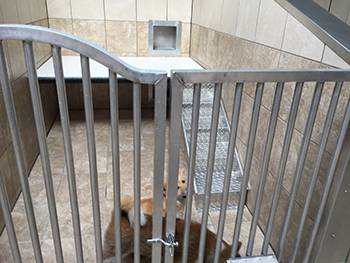Welfare of Dogs in Commercial Breeding Kennels
Since 2012, a major focus of our research has been the welfare of dogs in licensed commercial breeding kennels. Although people often use the terms "commercial dog breeding kennels", and "puppy mills" synonymously, they are not the same. We define a puppy mill as a dog breeding facility that prioritizes profit over the well-being of the dogs. Puppy mills show no interest in or effort toward supporting dog welfare. We do not support them, and we do not work with such operations. We only work with kennels that are USDA inspected and in compliance with state and federal standards for canine welfare.
Our initial research focused on several important areas, including:
- Developing tools for assessing the welfare of dogs on-site in kennels
- Understanding the effects of different flooring surfaces on dog foot health
- Examining the effects of housing, management and stress on dams, studs and their puppies
We continue to expand our research questions to address dogs’ welfare needs, and are currently focused on:
- Rehoming of retired breeding dogs
- Ethical sourcing of dogs
- Welfare implications of transportation for dogs and puppies
Our research increases knowledge about the welfare needs of commercially bred dogs. It also directly informs the standards of care we have created and offer through the Canine Care CertifiedTM program.
Studies
Ethical, Sustainable Sourcing and Supply of Dogs

The high demand for dogs, in part driven by the human-dog bond, requires deliberation and collaboration to ensure that there are enough dogs available for those who want them and that dogs’ welfare needs and interests are appropriately considered and met regardless of their source. The goals of this project are to build capacity in education, outreach, discovery, and application of knowledge related to canine welfare and other ethical issues associated with dog breeding, sourcing, and supply.
We aim to achieve these goals through facilitating moral deliberation and action in thought leaders with relevant experience and expertise to help prioritize and promote innovation and demonstrable progress in advancing the welfare of dogs as a key component of ethical, sustainable dog sourcing and supply. We also aim to advance stakeholder knowledge about breeding dog welfare and sustainable sourcing of dogs through research and outreach collaborations that translate to real-world impacts. Additionally, we aim to facilitate public understanding and informed decision-making about ethical sourcing of dogs and what is needed to support their welfare and the human-dog bond.
Project Leaders: Candace Croney (PI), Judi Stella, Mikel Delgado, and Traci Shreyer
Funding Source: Life of Riley at Spring Point
Establish Stress and Welfare Benchmarks for Puppies Intended for Detection Work
Detection canines (DC) are a critical asset to homeland security. The demand for DC capable of meeting the rigorous physical and behavioral standards necessary for optimal performance in operational environments continues to grow. However, their ability to work effectively in high-stress environments is critical and is a primary cause of rejection during selection for or early release from training or deployment. This creates a need to evaluate methods for optimizing early development and training practices for candidate dogs. The current study aims to understand the interactive effects of genetic and early environmental factors on the behavior, stress resilience, and welfare of working canines to inform selection and management practices that optimize their career tracking and performance.
This study is a subtask of a larger project with multiple partners involved
Subtask Leaders: Candace Croney (PI), Shanis Barnard, Alessia Diana
Subtask Collaborators: Paul Waggoner (Auburn University); Lucia Lazarowski (Auburn University); Cynthia Otto (University of Pennsylvania)
Funding Source: This study was funded by the Department of Homeland Security, Science and Technology Directorate, Detection Canine Program Office, in collaboration with Auburn University under contract #70RSAT22CB0000002
Behavioral and Physiological Responses of Dogs to Commercial Breeding Kennel Management and Caretaker Interactions
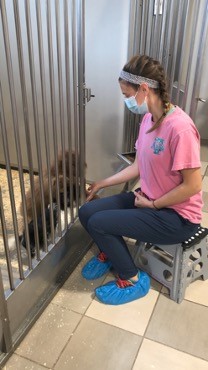
To ensure the welfare of dogs in commercial breeding kennels, it is important to evaluate the role management practices may play in influencing their behavioral and physical health. The aim of this study is to evaluate the effects of a short, positive caretaker intervention on the behavioral and physiological responses of dogs in commercial breeding kennels and to determine if effects persist over time and generalize to strangers.
Project Leaders: Candace Croney (PI), Kari Ekenstedt, Shanis Barnard, Traci Shreyer, Aitor Arrazola
Funding Source: Life of Riley at Spring Point
Evaluation of Genetic and Physiological Metrics of Stress and Welfare Experienced by Dogs from Commercial Breeding Kennels Before, During and After Rehoming
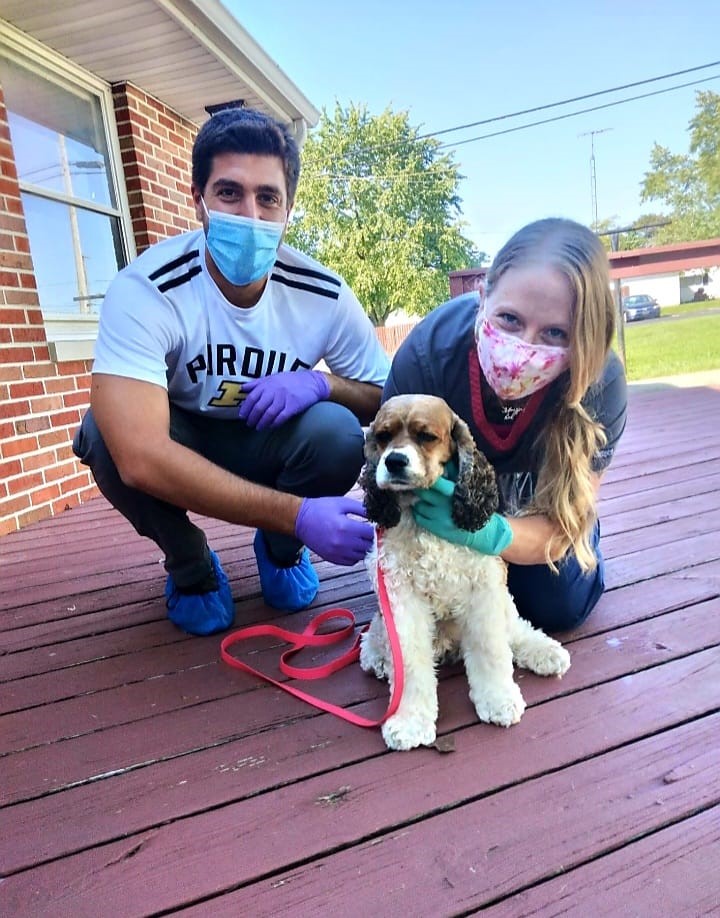
Rehoming of dogs from commercial breeding kennels requires study and careful planning to avoid creating problems. It is important to properly transition dogs from the kennel environment to retirement, to identify and prepare those assessed to be viable rehoming candidates, increase the number of adoptable dogs, and plan appropriately for retirees who are unlikely to be successfully rehomed.
In an effort to understand lifetime stress in dogs maintained in commercial breeding kennels and stress associated with transitioning to new family homes, a longitudinal study is currently ongoing to help investigate whether associations exist between genetic, behavioral, and physiological metrics. This will ultimately determine which of these markers may yield the most useful information for long and short-term assessments of canine stress and welfare in breeding kennels during and after rehoming.
Project Leaders: Candace Croney (PI), Kari Ekenstedt, Shanis Barnard, Traci Shreyer, Aitor Arrazola
Funding Source: Life of Riley at Spring Point
Related Publications:
Transformative Education, Engagement and Community-Building Plan

A major limiting factor in creating positive change in dog welfare in commercial breeding kennels is breeder access to high quality, evidence-based information and educational venues on the topic of canine welfare science. There is currently an unmet need for accessible resources on canine welfare and related tailoring of kennel management for breeders as well as for shelters and rescues.
The aim of this project is to develop, deliver and evaluate a comprehensive outreach education plan translating the new research-based knowledge we create to dog breeders, animal health and pet industry professionals, kennel managers and other interested parties via multiple media.
Project Leaders: Candace Croney (PI), Traci Shreyer, Taylor Rezvani
Funding Source: Life of Riley at Spring Point
Related Products/Publications:
- Canine Welfare Science Forum 2022
- Canine Welfare Science Website - https://caninewelfare.centers.purdue.edu/
Does Maternal Fear and Stress Impact Puppy Health and Behavior?
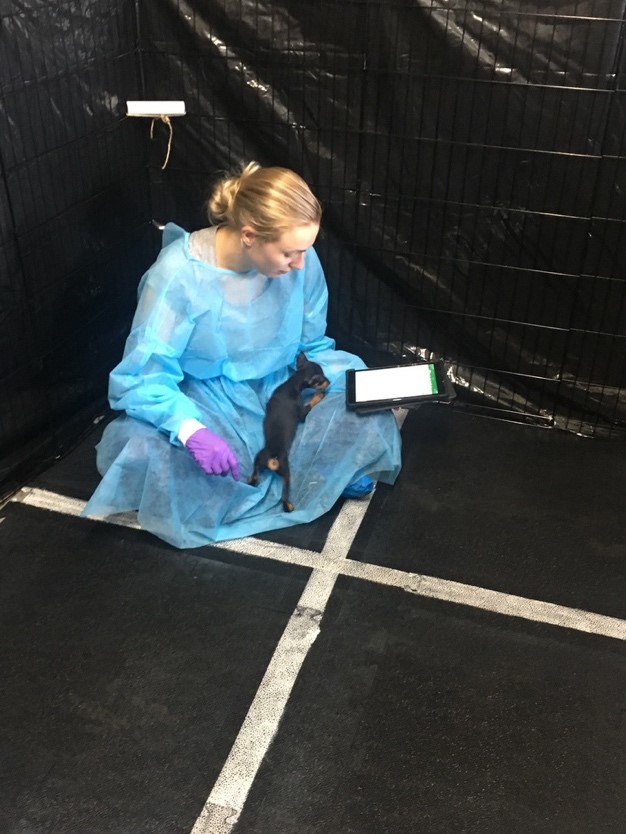
Maternal factors such as fear and stress influence offspring welfare in many species, but these relationships are currently understudied in dogs. The aim of this project is to conduct a longitudinal study to explore the effects of dams’ stress levels, behavior, and welfare on that of their litters within commercial breeding kennels. The outcome from this study will help inform breeder decision-making on dog selection, health care and management practices to mitigate welfare risks in adult dogs and their puppies.
Project Leaders: Candace Croney (PI), Kari Ekenstedt, Shanis Barnard, and Traci Shreyer
Funding Source: The Stanton Foundation
Related Publications:
Characterization of Maternal Care in Commercial-Breeding and Working Dog Populations and Its Relationship to Puppy Welfare
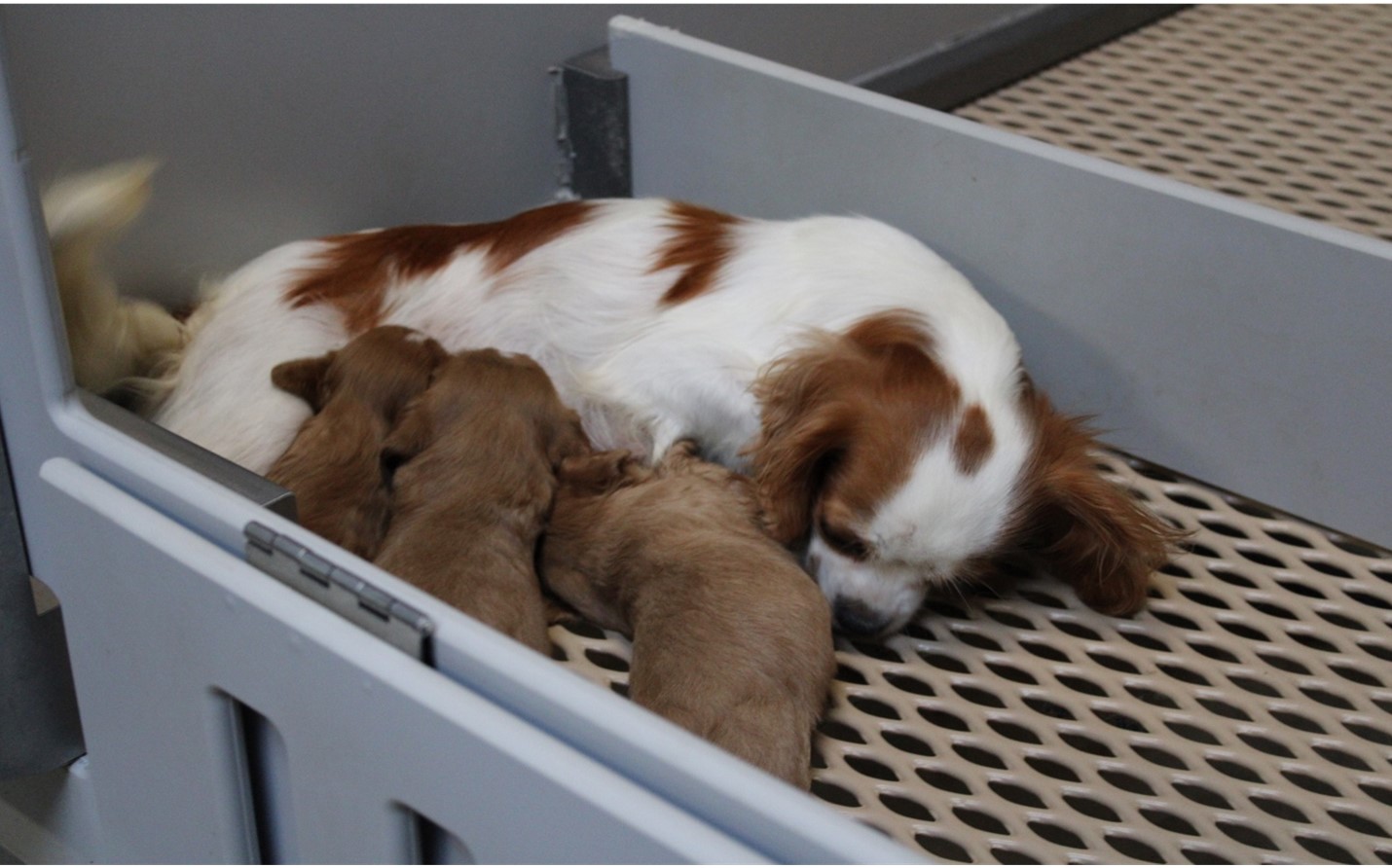
Puppies from commercial-breeding kennels may experience fear and distress when they are transported to a distributor and during their transition to a new family home. Maternal care may influence the behavioral and physiological responses of offspring to stressors, but these effects have not been investigated in dogs.
The aim of this study is to understand the relationship between maternal care and puppy welfare and to ultimately improve puppies’ ability to cope with stressors.
Project Leaders: Candace Croney (PI), Kari Ekenstedt, Shanis Barnard, Traci Shreyer, Alessia Diana
Collaborators: Lucia Lazarowski, Paul Waggoner, Auburn University
Funding Source: The Stanton Foundation
Related Publications:
Establishing Science-based Standards for the Care and Welfare of Breeding Dogs
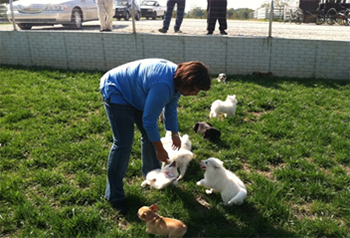
Commercial dog breeding, which helps to meet high public demand for purebred dogs, faces significant scrutiny and criticism relative to the health and well-being of the dogs and puppies produced. Regulated commercial breeding kennels often have difficulty distinguishing themselves from puppy mills, wherein profit is prioritized over the well-being of dogs. This project aims to help the US pet industries address the socio-ethical and scientific (well-being) concerns embedded in commercial dog breeding by developing and testing voluntary standards for the care and well-being of dogs in commercial breeding facilities that far exceed minimum (legislated) standards.
Project Leaders: Candace Croney (PI)
Funding Source: World Pet Association & Pet Food Institute
Related Publications:
Effects of Flooring on Breeding Dog Welfare and Cleanliness
The aim of this study was to characterize the relationship between flooring types common in US breeding kennels and the physical health, body and kennel cleanliness of dogs housed on them. The results indicate that dog foot health and cleanliness can be maintained on the flooring substrates assessed. Dog comfort, behavior and preferences for flooring types require investigation.
Project Leaders: Candace Croney (PI), Judith Stella
Funding Source: World Pet Association & Pet Food Institute
Related Publications:
Findings
- The foot health of dogs housed on 3 types of flooring- diamond-shaped coated expanded metal (i.e. Tenderfoot), polypropylene, and concrete- were assessed. Few foot, elbow or hock problems were identified on any flooring type.
Related Publications:
- A cross-sectional study to investigate associations between flooring substrates and prevalence of limb and paw abnormalities of dogs housed in commercial breeding facilities
- Does flooring substrate impact kennel and dog cleanliness in commercial breeding facilities?
- Assessing the physical well-being of dogs in commercial breeding facilities
- Effects of flooring on animal health and well-being: Implications for kenneled dogs
Prevalence of Periodontal Disease in Commercial Breeding Kennels
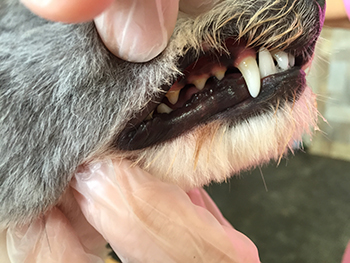
Periodontal disease, inflammation and breakdown of the structures that support the teeth, is one of the most commonly mentioned health concerns for dogs in commercial breeding facilities. However, to this point, no research has been performed to determine how common periodontal disease actually in within breeding facilities. This project has 2 goals: to determine what percentage of dogs in commercial breeding facilities have severe periodontal disease and to evaluate how well inspecting the teeth and gums of an awake can detect periodontal disease.
Project Leaders: Candace Croney (PI), Judith Stella, Amy Bauer
Funding Source: World Pet Association & Pet Food Institute
Evaluating the validity of a visual dental scale for detection of periodontal disease in non-anesthetized dogs.
Findings
- A visual assessment tool for scoring dental disease in awake dogs was compared to the "Gold Standard" of examination under anesthesia with radiographs to determine its validity and reliability.
A cross-sectional study to estimate prevalence of periodontal disease in a population of dogs (Canis familiaris) in commercial breeding facilities in Indiana and Illinois
- Periodontal (dental) disease (PD) was visually scored using a 0-IV scale where 0 is no disease and IV is severe disease.
Related Publications:
Development of Field-Ready Welfare Assessment Tools for Breeding Kennels and Shelters
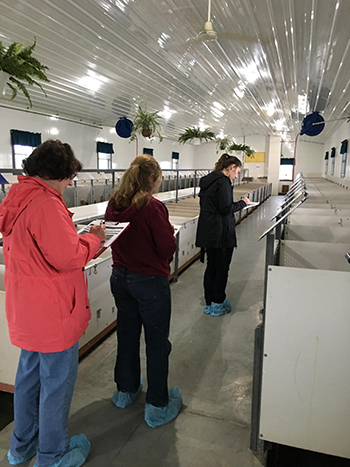
Quick and accurate assessments of the health and welfare of kenneled dogs are essential for ensuring and promoting dog welfare. Because many welfare metrics exist and observers or inspectors may prioritize these differently, reliable, standardized measures of welfare may facilitate consistent, objective evaluation of dogs. A non-invasive tool, incorporating behavior was developed and pilot-tested by experts and novices in animal behavior and welfare with dogs housed in commercial breeding facilities and at shelters.
Project Leaders: Candace Croney (PI), Amy Bauer
Funding Source: World Pet Association & Pet Food Institute
Do you see what I see? Developing a field-ready welfare assessment tool for kenneled dogs
- Developed a field assessment tool that allows for a rapid assessment of the health and welfare of kenneled dogs by individuals with limited training.
Related Publications:
- Advancing canine welfare assessment in kennels: evaluating the validity of Field Instantaneous Dog Observation (FIDO) scoring in commercial breeding kennels
- Evaluating FIDO: Developing and pilot testing the Field Instantaneous Dog Observation tool
- Assessing kennel dog welfare
- Kenneled dog welfare: Challenges of field assessment
Behavioral Wellness Considerations in Breeding Dog Retirement and Rehoming

Objective, science-based information is needed to establish best practices for transitioning dogs out of their breeding careers and to minimize risks of poor rehoming outcomes. This study aims to develop physical and behavioral well-being criteria for rehoming candidates, identify breeder practices that facilitate or make transitioning to rehoming risky, and develop a breeder education program emphasizing behavioral well-being, self-assessment and appropriate planning for all phases of a breeding dog's life with emphasis on preparing retired breeding dogs for success outside of the kennel environment.
Project Leaders: Candace Croney (PI), Judith Stella, Amy Bauer
Funding Source: The Stanton Foundation
Welfare Considerations in Rehoming Breeding Dogs
Improving canine welfare in commercial breeding operations: evaluating rehoming candidate and practices
- Assessed the behavior of dogs for risk of transition problems during rehoming using a 4-step stranger approach test. Based on the results of this test, 41.7% of the dogs assessed were at risk.
Related Publications:
- Welfare considerations in rehoming breeding dogs
Public Perceptions of Dog Welfare, Acquisition and Information Sources
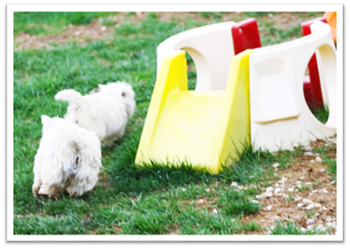
Project Leaders: Courtney Bir, Nicole Widmar, Candace Croney (PI)
Funding Source: World Pet Association & Pet Food Institute
Related Publications:
- Factors that impact dog selection and welfare
- Stated preferences for dog characteristics and sources of acquisition
- U.S. residents' perceptions of dogs, their welfare and related information sources
- Public perceptions of dog welfare, sourcing and breeding regulation
- Public perceptions of dog acquisition: Sources, rationales and expenditures

